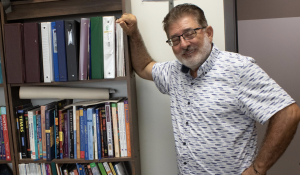Sac State helps train future leaders
March 22, 2006
A shortage of qualified managers and executives for California’s state agencies looms, but higher education institutions, like Sacramento State, may be able to help by providing the skilled employees needed.
Many speakers addressed this topic during the Executive Leadership Symposium Thursday, hosted by the university’s College of Continuing Education.
Robert Fountain, director of the Applied Research Center at Sac State, said the state’s dwindling labor pool is facing a potentially dire situation.
“My real job today is to frighten you into thinking about the future,” Fountain told the full-capacity audience at the Alumni Center.
The once plentiful availability of skilled employees is diminishing rapidly as a result of an aging work force, a smaller group of young workers entering the system and a change in state retirement age from 60 to 55 years, according to the California Performance Review.
And according to the State Personnel Board, within five years about 70,000 or 34 percent of state employees will turn 55 and will be eligible to retire.
“The highest educated work force ever is retiring before our very eyes,” Fountain said. “We are losing the edge they provided, and what’s happening now isn’t a current crisis, but the beginning of a long-term trend.”
The ever-present competition from the private sector elevates the situation. Fountain said using university resources could alleviate some struggles that state agencies will face.
Because Sac State is located in the capital area, along with one-third of the state’s work force, Fountain said that the campus is in a unique position to partner with government and “get things done.”
“Creating a new category of university, a metropolitan university rather than just a research or teaching university that recognizes the surrounding community as a resource and a place to apply what is learned at the university is crucial,” Fountain said.
The College of Continuing Education specializes in this type of community interaction by linking adults ?” trained through their program ?” with surrounding state agencies.
“Our expertise is professional development training, especially in the areas of leadership and management,” Alice Tom, dean of the College of Continuing Education, said in a prepared statement.
The California State Water Resources Control Board wants to improve the analytical, writing and strategic thinking skills of the department’s analysts, said Esteban Almanza, chief of Administrative Services for the board.
Almanza credited the College of Continuing Education with developing a two-week program that helped the agency confront its shortcomings.
“Participants come with an idea to make the water board better and they take that through the program,” Almanza said. “This helps in developing performance measures, which actually do get implemented throughout our agency.”
At the California Department of Corrections and Rehabilitation, the main challenge is establishing a program that ensures a well-trained work force despite the variety of jobs within the department, said Jennifer Shaffer, assistant secretary for the Office of Victims’ Rights and Services.
She said Sac State faculty and consultants visited prisons and offices to gather information and then shaped a training curriculum.
Shaffer described the resulting program as “very dynamic, exciting and thought provoking.”
“It’s nice to have unbiased, neutral yet knowledgeable experts to talk with staff and deliver the same message to all levels and components of CDCR (California Department of Corrections),” Shaffer said.
The next step for the department is a seven-day training session for 300 mid-level managers, said Shaffer, who recommended that more state agencies take advantage of partnering with Sac State.
The College of Continuing Education also collaborates with private sector businesses and individuals, according to its Public Relations Manager, Bethany Boom.
“We’re here to extend resources to the community in order to augment business development and personal enhancement,” Boom said.
Other speakers at the symposium included Fred Buenrostro, CALPERS CEO; James Gomez, California Association of Health Facilities president; Rosario Marin, secretary of the state and consumer services agency; and Sac State President Alexander Gonzalez, who provided the opening remarks at the breakfast affair.
Norm Erickson can be reached at [email protected]


























































































































